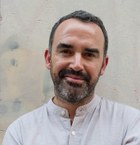2025 Faculty
Meet your instructors for the eighth edition of the Mediating Italy in Global Culture Summer School

Luca Barra
Director of the Summer School and Full Professor of Television, Università di Bologna
Luca Barra is Full Professor at Università di Bologna, where he teaches Radio and Television History, Cultures of Television Production and Serial Tv Production, and a former post-doctoral research fellow at Università Cattolica, Milan. His research mainly focuses on television production and distribution cultures, comedy and humour TV genres, the international circulation of media products (and their national mediations), the history of Italian television, and the evolution of the contemporary media landscape. He is the author of the books La sitcom. Genere, evoluzione, prospettive (Carocci, 2020), Palinsesto (Laterza, 2015) and Risate in scatola (Vita e Pensiero, 2012), co-editor of A European Television Fiction Renaissance. Premium Production Models and Transnational Circulation (with M. Scaglioni, Routledge, 2021), Media-storie. Lezioni indimenticate di Peppino Ortoleva (with G. C. Calvagno, Viella, 2020), Taboo Comedy (with C. Bucaria, Palgrave, 2015), Backstage (with T. Bonini and S. Splendore, Unicopli, 2015) and Tutta un’altra fiction (with M. Scaglioni, Carocci, 2013), and has written essays in various edited volumes and journals. He is editorial consultant for Italian TV studies journal Link. Idee per la televisione and the co-director of SuperTele book series published by minimum fax. He is currently in the board of directors of Italian culture and politics journal Il Mulino, coordinator of the second cycle degree in INCOM – Information, Cultures and Media Organization and member of the scientific committee of the Master in Music Production and Promotion at Università di Bologna.

Nicoletta Marini-Maio
Professor of Italian and Film Studies, Dickinson College
Professor Marini-Maio completed her Ph.D. at the University of Pennsylvania, specializing in Italian cinema. She is the Editor of the international open-access peer reviewed journal "gender/sexuality/italy". Her main fields of research are film studies, Italian cinema, and theater, particularly the intersections between politics, gender, cultural representations, popular culture, the narrative mode, and collective memory. She recently published a book on Silvio Berlusconi in cinema. Her monograph on the representation of left-wing terrorism in Italian film and theatre is near to completion. In addition, she is currently doing research on the "decamerotici," a series of movies inspired by Boccaccio's Decameron produced in Italy in the 1970s, and on Le Winx, an international comic strip and video series for young girls created in Italy. She has published articles on Italian cinema and theatre, Italian teaching pedagogy, and technology-enhanced language learning. In these areas, she has also co-edited the scholarly volumes Set the Stage! Teaching Italian through Theater (Yale University Press, 2009) and Dramatic Interactions (Cambridge Scholars, 2011). At Dickinson she is the current Director of the Mosaics Programs, and she also serves as the Vice President of the American Association for Italian Studies.

Massimo Riva
Professor of Italian Studies, Brown University
Massimo Riva is Professor and Interim Chair of Italian Studies, Director of Graduate Studies, Coordinator of the Virtual Humanities Lab, Affiliated Professor of Modern Culture and Medi at Brown University. He has published on a wide range of topics, including several authored and edited or co-edited books on literary maladies and national identity in the eighteenth and nineteenth centuries, post-humanism and the hyper-novel, contemporary Italian fiction and the future of literature in the digital age. Since the 1990s, his pioneering work in the digital humanities has led to the creation of several projects, including the Decameron Web, recipient of two major grants from the National Endowment for the Humanities, the Virtual Humanities Lab, also supported by a two-year grant from the NEH, the Pico della Mirandola Project, and the Garibaldi Panorama & the Risorgimento Archive. He is the recipient of several fellowships, including a Digital Innovation fellowship from the American Council of Learned Societies. He has recently completed a digital monograph entitled Italian Shadows. A Curious History of Virtual Reality, a project of the Brown Digital Publications Initiative, funded by the Andrew W. Mellon Foundation (Standford University Press). In recognition of his research-based teaching, he was nominated Royce Family Professor of Teaching Excellence. His awards and honors also include the Order of Merit of the Italian Republic for his contribution to the dissemination of Italian culture in North America. His latest book is Shadow Plays: Virtual Realities in an Analog World, Stanford University Press, 2022 (translated in Italian by Einaudi in 2025).

Emiliano Rossi
Summer School Tutor and Post-Doc Researcher, Università di Bologna
Emiliano Rossi holds a PhD in Cinema, Photography and Television at the Department of the Arts, University of Bologna, and is involved as a post-doc researcher in ATLas - Atlas of Local Television project. His main area of interest is television, framed on a historical, social and productive level. He teaches Organisation and Management of Multimedia Systems at the University of Bologna, where he is also responsible of the Television and Web TV laboratory and class tutor of Media Management and Economics and Marketing of Audiovisual Media courses. He also works as an adjunct professor in Radio-Tv Theories and Techniques at Università degli Studi di Padova and Università degli Studi di Udine. Together with Elisa Farinacci, he has been part of the organizing committee of the summer school since 2019; since 2024 he has been part of the school's teaching staff. Some reflections of this experience have converged in a report published by La Valle dell’Eden (“Mediating Italy in Global Culture: l’esperienza di una summer school internazionale all’Università di Bologna”, co-authored with Elisa Farinacci). He took part in several national and international conferences, and his monography (Schermi di trasporto. Storia, produzione, immaginari) was published in 2023; his writings have appeared in volumes and journals, including Cinéma & Cie, Cinergie. Il cinema e le altre arti, Imago. Studi di cinema e media, La Valle dell’Eden, VIEW. Journal of European Television History and Culture.

Alberto Basset
Full Professor of Ecology, Università del Salento
Alberto Basset is Full Professor of Ecology at the University of Salento, Dept of Biological and Environmental Sciences and Technologies, since 2000 and, as associate scientist, at the National Research Council, Institute of Marine Sciences, since 2018. At the University of Salento, Alberto Basset is the Head of the Ecology Laboratory, Head of the Biodiversity Organisation and Ecosystem Functioning Research Infrastructure realised with a PON R&I Infrastructure project (BIOforIU), Director of the Observatory on Mediterranean Ecosystem Health and of the Museum on Mediterranean Ecosystems of the University of Salento since 2008. Previously, Associate Professor of Ecology at the University of Salento since 1998, University Researcher at the University of Cagliari since 1984, Fellows of the National Research Council at the Centre of Evolutionary Genetics c/o University of Rome "La Sapienza" since 1982. At the University of Salento Alberto Basset has been Coordinator of the PhD programme in Ecology (2000 – 2013) and in Ecology and Climate Change (2013 - 2015), of the laurea Specialistica in Ecology (2004-2010) and Coordinator of the University Interregional Programmes (2001 – 2007).

Manuela De Giorgi
Associate Professor of History of Art, Università del Salento
Art historian and Associate Professor of History of Medieval Art and Byzantine Art at the University of Salento, after training in Lecce, Viterbo and the UK, she worked at the Kunsthistorisches Institut (Max-Planck-Institut) in Florence and since 2006 she has been teaching at the University of Calabria and in Lecce. His main research topics include Byzantine and Medieval iconography and iconology; the cult of saints between East and West; Byzantine sculpture in Greece and Asia Minor; issues related to execution techniques, diagnostics and the conservation of wall and panel artefacts; and, above all, monumental painting in the peripheries of the Eastern Empire (Southern Italy, the Balkans and the Caucasus). She has lectured both in Italy and abroad and her main publications include a monograph study on the iconography of the Virgin Mary as well as a certain number of articles.

Matteo Marinello
Post-Doc Researcher, Università di Bologna
Matteo Marinello is a Research Fellow at the Università di Bologna (Department of the Arts), where he's involved in the research projects "Circulation of Populist Sentiments in 21st Century Film and TV Fiction in Italy" and "ATLas - Atlas of Local Televisions". His main interests are the relationship between politics and entertainment, television comedy and serial representations of Italian history. He teaches History and Theory of Television at the Universities of Bari and Padua and obtained his doctorate on the relationship between comedy and politics in the history of Italian television (1969-82).

Catherine O’Rawe
Professor of Italian Film and Culture, University of Bristol
Catherine O'Rawe deals in particular with Italian genre cinema, analyzing the relationships with Hollywood models and the construction of divisive figures through the perspective of gender studies. She is the author of articles and chapters on contemporary and post-war Italian cinema. She edited with Helen Hanson the volume The Femme Fatale: Images, Histories, Contexts (2010) and with Alan O'Leary the special issue of Italian Studies Thinking Italian Film (2008). In 2014 she published his book on the representation of masculinity in contemporary Italian cinema, Stars and Masculinities in Contemporary Italian Cinema (2014), while in 2023 she was the author of The Non-Professional Actor. Italian Neorealist Cinema and Beyond (Bloomsbury). From 2019-24 she was co-investigator on the European Research Council-funded project Studiotec: Film Studios: Infrastructure, Culture, Innovation in Britain, France, Germany and Italy, 1930-60. Previously, she was co-Investigator on the AHRC-funded research project In Search of Italian Cinema Audiences which combined oral history, audience studies and archival research to generate a portrait of post-war Italian cinema audiences.

Paolo Tosini
Professor and Course Coordinator, Centro Sperimentale di Cinematografia
Paolo Tosini studied film restoration at the University of Udine and at the Bundesarchiv in Berlin. He has worked at various international festivals as a manager and technical director, including Le Giornate del Cinema Muto, FILUX, and Distrital. In 2009, he moved to Mexico, where he founded and directed the Digital Restoration Laboratory at the Mexican National Film Archive (Cineteca Nacional) for five years. He has overseen numerous restoration projects, notably El Automóvil Gris and Documento Z-3. He works as a consultant in film preservation and restoration for various archives, including the General Archive of the Dominican Republic, the Bogotá Film Archive in Colombia, the National Film Archive of Ecuador, and the Pablo Ducros Hicken Film Museum in Buenos Aires. He has conducted courses on film and digital restoration, as well as archival projection, in several Latin American countries, the United States, and Italy. He is currently the Print Manager of Le Giornate del Cinema Muto and President of Vulcanus Film, a project aimed at enhancing the value of audiovisual heritage. At present, he serves as the academic coordinator of the course in Conservation and Management of Audiovisual Heritage at the Centro Sperimentale di Cinematografia, where he teaches Theory and Methodology of Film Restoration, Theory and Technique of Cinematic Projection, Theory and Practice of Digitisation, and Preservation of Film Media.

Giacomo Manzoli
Full Professor of History of Italian Cinema, Università di Bologna
Giacomo Manzoli is Full Professor of History of Italian Cinema at the University of Bologna, where he also teaches History of Italian Cinema and Audiovisual Forms of the Popular Culture. Currently, he is the president-in-chief of CUC - Consulta Universitaria del Cinema. He has been visiting professor at Urbino University, Catholic University in Milan and Tonji University of Shanghai, and he has held the course of Modernity Italian Style at Brown University, Providence, USA (2011 and 2017). He directed the Study Program of DAMS, Drama, Arts, Film and Music Studies from 2007 to 2010 and the Master Program in Film, Television and Multimedia Production from 2012 to 2014. He published several monographs and articles in journals and reviews. His current research is focused on the relationship between film industry and symbolic forms in contemporary Italian cinema, especially with regards to the role of public funding in promoting specific aesthetics and politics. He is also member of the board of the following journals: Studi culturali (il Mulino), Bianco & Nero (CSC), The Italianist (Maney), L’avventura (il Mulino), and co-director (with Mariagrazia Fanchi and Tomaso Subini) of Schermi. Storie e culture del cinema e dei media in Italia (University of Milan).

Dana Renga
Professor of Italian and Dean of Arts and Humanities, The Ohio State University
Dana Renga researches and teaches on Italian film and media studies, with a focus on television. She is core faculty in The Film Studies Program, and affiliated faculty in The Department of Comparative Studies and The Department of Women’s, Gender, and Sexuality Studies. She teaches courses on Italian film and television at both the undergraduate and graduate level and regularly teaches General Education courses. In addition to two monographs, one co-authored book, and an edited volume, she has published over forty articles and book chapters on Italian cinema and television, Italian popular culture, and modern and contemporary Italian poetry and literature. Her most recent monograph from 2019 is called Watching Sympathetic Perpetrators on Italian Television: Gomorrah and Beyond and offers the first comprehensive study of recent, popular Italian television. She is currently working on a book called #castingstardom (a project on casting practices in the US and in Italy), on a co-edited volume called Contemporary Italian Youth Television (with Luca Barra, Danielle Hipkins, and Catherine O'Rawe) and on second co-edited volume tentatively titled Transnational Italian Crime and the Making of Italy (with Stephanie Malia Hom).

Elisa Farinacci
Summer School Tutor and Research Fellow, Università di Bologna
Elisa Farinacci is a junior research fellow in Cinema, Photography, and Television at the Department of the Arts of the University of Bologna. She earned a Ph.D. with a double degree in History at the Department of History, Culture, and Civilization of the University of Bologna and in Cultural Anthropology at the Hebrew University of Jerusalem. At the Department of the Arts, she has been conducting research on the circulation and reception of contemporary Italian audiovisual products in Europe and the USA. She is also collaborating with the Research Center on Media Education, Innovation, and Education Technology (CREMIT) of the Catholic University of Milan. At CREMIT she is overseeing a project on the use of audiovisual products in educational environments. She is also the curator of the international column “Global Cremit: International Perspectives” and a member of the editorial board of "il Mulino". Since 2018, she has been co-organizing the Summer School "Mediating Italy in Global Culture".

Luca Bandirali
Fixed-Term Researcher of Film and Television, Università del Salento
Luca Bandirali (PhD) is a researcher in film and television studies at the University of Salento. He collaborates with the Centro Sperimentale di Cinematografia (BA in Audiovisual Heritage Conservation and Management). He is a member of the steering committee of academic journal Fata morgana. He is responsible for the local unit of the PRIN PNRR “Telling the Territory. The documentary production of local television broadcasters in Calabria and Apulia (1974-2004)”. He is scientific director of the project “TOCC - Capacity Building for cultural operators to manage the digital transition”. He was a member of the Board of the Apulia Film Commission Foundation. His main research interests concern the aesthetics of film and TV series and the geography of cinema. His most recent publications include: Concept TV. An Aesthetics of TV Series (with Enrico Terrone, Lexington Books, 2021) and Medium loci. Spazio, ambiente e paesaggio nella narrazione audiovisiva (Pellegrini Editore, 2022).

Paola Brembilla
Associate Professor of Television and Digital Media, Università di Bologna
Paola Brembilla is an associate professor at the University of Bologna, where she teaches Television and Digital Media.
She has been a speaker at several international conferences and is the author of numerous publications, including articles, chapters and five books, among which La televisione italiana. Storie, generi e linguaggi (with L. Barra and V. Innocenti, Pearson 2024), Franchise Mediali. Industrie, narrazioni, pubblici (Pàtron, 2023) e It's All Connected. L'evoluzione delle serie TV statunitensi (Franco Angeli, 2018). She is managing editor of SERIES, and Principal Investigator of the project "WokeIt. Investigating Representation, Inclusivity and Social Responsibility in Rai’s Fiction Audiovisual Productions" (PRIN 2022 PNRR). She currently serves as the Director of Second Cycle Degree in Cinema, Television and Multimedia Production.

Jonathan Mullins
Assistant Professor of Italian Film and Media Studies, The Ohio State University
Jonathan Mullins is Assistant Professor of Italian Film and Media Studies at The Ohio State University. The main concerns of his research are the history of the Italian left, the use and representation of the body and the way media facilitate the creation of mass, sub, and countercultures. He is currently preparing a book manuscript, Ephemeral Media, Everyday Dissent: the Radical Left in 1970s Italy, which tracks how radical leftists turned to ephemeral cultural forms - street performance, alternative radio broadcasts, photography, graffiti, and print marginalia - to invigorate their political practice. A second book, The Poetics of Exhaustion: Italian Realisms in the Age of Berlusconi, is also underway. His publications have appeared in The Italianist, Italian Studies, the Journal of Romance Studies and World Picture. Prior to his arrival at Ohio State, he taught at the University of Southern California and Dartmouth College. He has also been a visiting postdoctoral fellow at Yale University’s Beinecke Rare Book & Manuscript Library.

Claudio Giunta
Full Professor of Italian Literature, Università di Torino
Claudio Giunta is Full Professor of Italian Literature at the University of Turin and a specialist in medieval literature. His academic publications include La poesia italiana nell’età di Dante (Il Mulino, 1998), Due saggi sulla tenzone (Antenore, 2002), Versi a un destinatario (Il Mulino, 2002), Codici. Saggi sulla poesia del Medioevo (Il Mulino, 2005), and a commentary on Dante’s Rime for the Meridiani Mondadori series (2011–12). He has been a fellow at the American Academy in Rome, the Harvard Center for Renaissance Studies in Florence, and the Warburg Institute in London. He contributes regularly to Il Sole 24 Ore, Il Foglio, Il Post, and Internazionale, and co-directs the journal Nuova Rivista di Letteratura Italiana. His most recent books include Le alternative non esistono. La vita e le opere di Tommaso Labranca (Il Mulino, 2020), Togliatti. La fabbrica della Fiat (with Giovanna Silva, Humboldt Books, 2020), and Ma se io volessi diventare una fascista intelligente? L’educazione civica, la scuola, l’Italia (Rizzoli, 2021).

Eugenia Paulicelli
Professor of Italian, CUNY
Eugenia Paulicelli is Professor of Italian in the Department of European Languages and Literatures at Queens College and at the Graduate Center of the City University of New York. At The Graduate Center, she is appointed faculty in the programs of Comparative Literature, Women and Gender Studies, Film Studies and The Master of Arts in Liberal Studies (MALS). In Italy, she specialized in English literature, semiotics, and feminist theory. In the US, during graduate school, she furthered her research interest in the relationship between word and image, art and literature, and critical theory, from which her approach to fashion has drawn. Since then, she has worked on establishing the study of fashion at CUNY with an academic and inter-disciplinary approach in the Italian and Women’s Studies programs, and in collaboration with colleagues in the arts and humanities, social sciences, and digital humanities. Her research spans the history and theory of fashion, the relationship between fashion, film, literature and other media, the politics of gender and race, women’s history, and the role of narrative in nation building. She has pioneered The Fabric of Cultures Project and has curated several exhibitions, authored and co-curated an academic book of the same title and two catalogues. As author, editor and co-editor, she has written 13 books and several contributions on various journals.